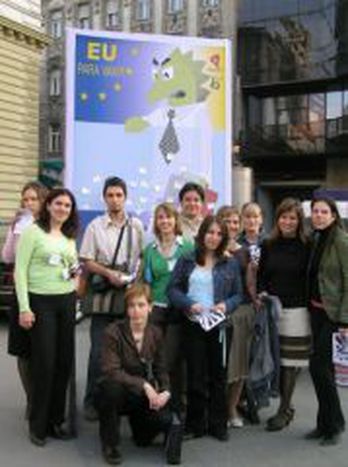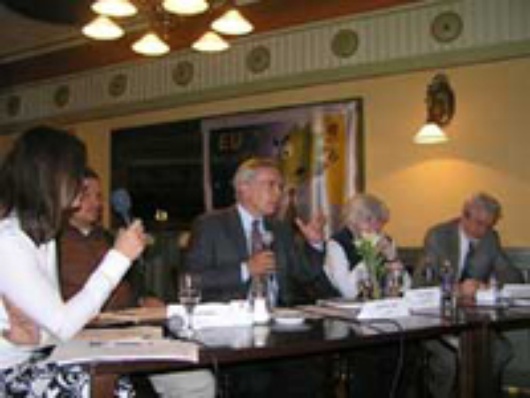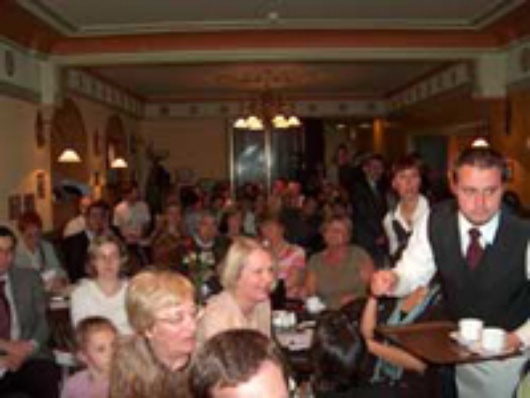
Quo vadis Europe?
Published on
Dragon is the head; polyp is the lower body; and holds a briefcase in its hand. This is how the two-meter-tall canvas-monster, displayed in one of the busiest transport hubs of Budapest by the Hungarian editorial team of cafebabel.com together with the Foundation for European Values, looks like.
On 9 May 2006 Hungarian team invited students, journalists, professors and others to “Centrál”, a famous café from the early years of the XXth century, to discuss their fears together with eminent experts.
The title of the show-piece, EU paraván / para van contains a play on words, meaning a display panel (paraván) for fears (para van). Thus, passers by were invited to stick their concerns connected to the Union on the monster. Here are some of them:
“Everything is going well, but it was better in the past”, says one. “I cannot see the future” or “We are second class EU Members” voice others, and so it goes on the bumpy road of our everyday-fears. Besides the resistances towards the EU, there are, nevertheless, some positive remarks: “I like it! The best thing is that, at the border check, you don’t have to pass under the “Non-EU” sign”, “I am glad that I can choose to go and study in the EU, and it only depends on me”, or briefly: “No para” (No fear).
 It was in the ambient surroundings of “Centrál”, a famous café from the early years of the XXth century, where all the interested (students, journalists, professors and others) gathered following the invitation of the Hungarian edition to discuss their fears and also to hear the reactions of eminent experts of the field. Bod Péter Ákos, University professor, Jeszenszky Géza, historian, Minister of Foreign Affairs (1990-94), Rácz Margit, research director of the Institute for World Economics of the Hungarian Academy of Sciences and Sükösd Miklós, political scientist, Central European University were all acting as “fear-therapists” in “Centrál”, where one could scarcely find an empty spot before 6 pm. The latecomers could only get a seat next to the various delicacies, such as “Somlói”-art noodle, stacked up on trays. The therapy begun over steaming coffee and the clattering sound of spoons, with the speakers starting in medias res talking about fears.
It was in the ambient surroundings of “Centrál”, a famous café from the early years of the XXth century, where all the interested (students, journalists, professors and others) gathered following the invitation of the Hungarian edition to discuss their fears and also to hear the reactions of eminent experts of the field. Bod Péter Ákos, University professor, Jeszenszky Géza, historian, Minister of Foreign Affairs (1990-94), Rácz Margit, research director of the Institute for World Economics of the Hungarian Academy of Sciences and Sükösd Miklós, political scientist, Central European University were all acting as “fear-therapists” in “Centrál”, where one could scarcely find an empty spot before 6 pm. The latecomers could only get a seat next to the various delicacies, such as “Somlói”-art noodle, stacked up on trays. The therapy begun over steaming coffee and the clattering sound of spoons, with the speakers starting in medias res talking about fears.
We always fear the unknown, asserts Rácz Margit, whereas Jeszenszky Géza claims that these fears are rooted in the period after the changes in 1989, when the rise of the standard of living could not meet previous expectations. The speakers are, nonetheless, united in affirming that membership of the Union is the only possible way for Hungary to progress. In the meantime, the first questions bring up the first concerns: “How can the Hungarian economy adapt itself to the introduction of the Euro?”  The biggest problem, according to Sükösd Miklós, is that the information concerning EU matters is mostly communicated in professional jargon, if there is communication at all. Thus, it is not much of a surprise if citizens are still uninformed about certain issues. One of the most common fears connected to the introduction of the Euro is that “with the Euro prices go high, but wages stay low”, yet it is only the form that changes, not the value. The same situation can be interpreted as a potential danger or as an opportunity – as it was put forward by Bod Péter Ákos, commenting on the same question. He went on to explain that only the discouraged, lacking the necessary impetus would perceive this opportunity as something dangerous. The Union does constitute a chance for Hungary, even if, as someone added, “the country does not exploit its opportunities with efficiency”.
The biggest problem, according to Sükösd Miklós, is that the information concerning EU matters is mostly communicated in professional jargon, if there is communication at all. Thus, it is not much of a surprise if citizens are still uninformed about certain issues. One of the most common fears connected to the introduction of the Euro is that “with the Euro prices go high, but wages stay low”, yet it is only the form that changes, not the value. The same situation can be interpreted as a potential danger or as an opportunity – as it was put forward by Bod Péter Ákos, commenting on the same question. He went on to explain that only the discouraged, lacking the necessary impetus would perceive this opportunity as something dangerous. The Union does constitute a chance for Hungary, even if, as someone added, “the country does not exploit its opportunities with efficiency”.
The responses tell us what kind of disadvantages Hungarians fear most. They would blame the Union for the loss of diversity, Christendom and poppy seed pasta, or even the loss of the whole country. Despite these opinions, the discussion ended in a positive atmosphere. In Jeszenszky’s words: “The Union holds the promise of a better Europe”.



